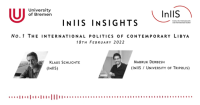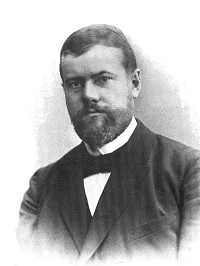News
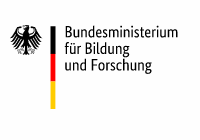
This project investigates the dynamics of knowledge production in the German fielf of peace and conflict research with respect to the military interventions in Afghanistan and Somalia. Specifically, it addresses the question if and how academic knowledge generated in this field makes it into security policy making of the federal government. These issues will be collaboratively analyzed together with Prof. Dr. Sophia Hoffmann (University of Erfurt) and Prof. Dr. Dirk Nabers and Dr. Frank Stengel (University of Kiel). Here at InIIS, Dr. Jude Kagoro and Prof. Dr. Klaus Schlichte will do the case study on Somalia/AMISOM. Starting in April 2022, the project will be funded for four years by the new BMBF program "Kompetenznetzwerke der Friedens- und Konfliktforschung."
 Picture: Pen and Paper
Picture: Pen and Paper
ECPR General Conference 2021, 31 August – 3 September 2021, University of Innsbruck, Austria
Chairs: Kressen Thyen (University of Bremen) & Alex Veit (University of Bremen)
Endorsed by the ECPR Standing Group on Political Economy and Welfare State Politics
In recent years, scholars of welfare state politics and social policy have paid increasing attention to internationalised welfare as a field of study. In contrast to the traditional welfare state literature which conceptualizes social policy primarily as a national issue, this relatively new branch of scholarship emphasises the influence of global dynamics and international entanglements on both social needs and welfare provision. Elements of internationalisation include a broad range of factors, from imperial legacies, globalized economies and geopolitical dependency to internationally fostered and financed social policy designs and benchmarking practices. These factors are particularly influential, but not limited to, welfare states in the Global South.
Different strands of research have contributed to our knowledge of internationalised welfare. Phenomena of internationalised welfare have been described in the fields of social history, international political economy, development studies, and public policy/global social policy. Also, more practice-oriented research on poverty reduction research, global health and humanitarian aid have contributed immensely. These research fields, however, are often too disconnected to bring forth collectively shared understandings of internationalised welfare.
Bringing these different strands of research together, this section seeks to advance empirical and theoretical discussions about internationalised welfare. Doing so, we aim to highlight continuities and changes in internationalised welfare from the ‘age of empires’ to the present period of ‘global social governance’. Specifically, we ask: How do global challenges and international political structures – from imperial rule to global governance – impact on national and local welfare institutions? What role do international and transnational actors play in the design, finance and provision of welfare systems? Which ideas and interests drive such involvement? Finally, how does internationalisation impact on state-society relations and collective expectations of the (welfare) state?
To address the above questions, we invite panels and papers from various disciplinary, geographical, and methodological backgrounds. We specifically encourage, but are not limited to, contributions focusing on welfare systems in late-developing and less industrialised economies as well as on international responses to welfare state crises.
How to submit your panel or paper
The section presently consists of four initial panels (abstracts below). We welcome individual paper proposals to these panels. To facilitate planning, please send your paper abstract by email to the section chairs by January 31, 2021.
Additional panel proposals, complete with 3-5 papers, and additional individual papers, are equally welcome. These should be submitted to the ECPR online platform by February 10, 2021: https://ecpr.eu/Events/Event/SectionDetails/1129
For any questions, please contact section chairs Alex Veit (veit@uni-bremen.de) or Kressen Thyen (thyen@uni-bremen.de).
Initial panels
From Imperial to Post-Imperial Welfare Policies: Continuities and Changes
Panel Chairs: Roy Karadag (karadag@uni-bremen.de) & Alex Nadège Ouedraogo (ouedraogo@uni-bremen.de)
This panel targets the imperial sources of internationalised welfare. It aims to bring together scholars who investigate and critically reflect upon the ideas, policy measures and practices of empires in identifying, problematizing and dealing with poverty, social crises and contestations from excluded groups across global peripheries. What were the features of this imperial wave of global social policy? Under which conditions did imperial politicians, bureaucrats and academics engage with teaching, healing and nurturing subject populations in colonies and protectorates? In which ways were these policies and practices themselves transformed in the late imperial years after the Second World War? What were the overall consequences for social policy making after decolonisation had finally materialised?
Organised around this set of questions, contributions ideally bridge the gap between themes of dependent development and the politics of empire, on the one hand, and of welfare statism and social policy, on the other hand. In particular, the goal is to theorise what the ‘imperial’ is in ‘imperial social policy and welfare’. Geographically, we invite papers that cover African, Middle Eastern and Asian contexts of imperial rule. With regard to policy fields, papers may cover anything from education, health, food, labour, pensions, housing and social assistance schemes. Contributions may render the multi-sited and multi-causal nature of imperial policy making visible, for example by investigating the various imperial justifications of policies and regulations, and the contestations they produced both within and beyond the respective imperial institutions.
Welfare in theGlobal South: Between Popular Contention, Statebuilding and Internationalisation
Panel Chair: Alex Veit (veit@uni-bremen.de)
This panel interrogates postcolonial welfare states in the Global South as processes and products of entanglement between domestic, international and transnational political configurations.
On the national level, public welfare connects state organizations and social groups. It may increase state legitimacy, but also trigger new demands. It addresses social inequality, but also manifests group privileges. It symbolises nationhood and provides vision, but also exposes gaps between ambition and implementation. Geographically, welfare bureaucracies embody the state in the most remote village, but also reproduce urban-rural divides. Welfare administrative knowledge is the backbone of planning for the public good, but such data can also be used as a tool of control and repression. In sum, welfare provision creates colourful, often contradictory bonds between states and populations.
At the same time, welfare states of the Global South are strongly internationalised. The design, finance, and provision of welfare is a complex process in which international organisations, bilateral donors, transnational NGOs, religious organisations and expert communities are centrally involved. While such international involvement arguably creates a “global social policy” in its infancy, it also renders concepts of sovereignty, citizenship, democracy, accountability, entitlement, and durability highly precarious. This fundamentally puts into question previous assumptions on welfare state formation.
To address these processes of entanglement between international, transnational and domestic configurations, we invite papers addressing or relating to the following questions: How can we conceptualise welfare in the Global South? How does internationalisation impact on everyday patterns of legitimation and contestation? In what ways did neoliberalism and structural adjustments disrupt postcolonial welfare politics? Where do countervailing ideas emerge against dominant welfare approaches?
Globalisation and Social Questions in the Countryside
Panel Chairs: Klaus Schlichte (klaus.schlichte@uni-bremen.de) & Anna Wolkenhauer (anna.wolkenhauer@uni-bremen.de)
A lot is going on in the countryside. In recent years, Sociology, Development Studies and Political Science have paid renewed attention to rural areas for a number of reasons. Deteriorating food security, increasingly frequently felt impacts of climate change, and a growing awareness of sustainability issues have put farmers back at the centre of attention.
Practices like land-grabbing, the depletion of natural resources, food insecurity or huge gaps in public service delivery seem to fuel forms of opposition that have hitherto rather been ignored by “capital IR”. This panel aims at interrogating social questions that specifically address rural areas, rural populations and internationalised politics targeting them. This can include social policies, rural development, food policies or other schemes geared by “the will to improve” (Tanya Li). While locally effective, state and non-state policies are embedded in a global system of development initiatives, governance structures, trade rules, and political representation more widely. We are convinced that IR is well-advised not to ignore the connections between rural change and international structures – historical and contemporary.
This panel invites contributions from IR and other disciplines related to the following questions: How are structural transformations in the countryside addressed by (internationalised) welfare? How have state retrenchment and a neoliberal redefinition of social policy affected rural areas? How are social and political questions related in the countryside; do welfare and political representation interact? What potential do food security interventions hold for social inclusion and transformation?
Climate Change and Poverty: Vulnerable Populations, Human Security & Social Justice
Panel Chair: Simon Chin-Yee (s.chin-yee@ucl.ac.uk)
Climate change plays an increasingly important role in discussions of poverty, human security and socio-economic risks. Vulnerable populations are increasingly susceptible to weather shocks, desertification, sea level rise and conflicts which can lead to poverty traps. Sustained eradication of poverty will depend on many socio-economic conditions, including access to health care, education and economic growth. Climate change impacts on poverty exponentially as vulnerable populations are more exposed to its effects and have less capacity to adapt or react to natural disasters. Additionally, climate change is increasingly seen as a threat multiplier further exacerbating impacts on human security. These are human rights and climate justice issues.
This panel seeks to examine how changing environmental conditions are impacting vulnerable populations with an eye to the future, answering questions such as: How can vulnerable communities avoid falling into the poverty trap? How do populations cope when experiencing negative shocks in multiple channels simultaneously? What responsibility does the global climate regime have to address issues of human rights and vulnerable populations? To what extent are climate related risks addressed by internationalised social policy-making?
A Clichéd View of Africa
07.07.2020Corona in the Global South
22.04.2020 Prof. Dr. Klaus Schlichte
Prof. Dr. Klaus SchlichteLack of resources in the health care system, the absence of tourism and the massive drop in labor remittances are three problems facing the countries of the Global South.
In its series "Podcast PolitikWissen", the University of Innsbruck had conducted a telephone interview with Prof. Klaus Schlichte on 21.04. (approx. 35 min, German.).
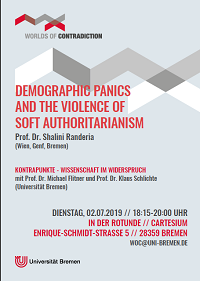 Poster for the lecture and workshop with Shalini Randeria
Poster for the lecture and workshop with Shalini RanderiaPublic lecture with workshop
Download the programme and the poster (PDF).
Lecture by Shalini Randeria | Vienna, Geneva, Bremen
Demographic Panics and the Violence of Soft Authoritarianism
with Michael Flitner and Klaus Schlichte | Bremen
02.07.19 | Tuesday | 18:00 - 20:00 | Rotunda (Cartesium), Uni Bremen
Workshop with Shalini Randeria and Ranabir Samaddar | Calcutta Research Group
Soft Authoritarianism, Primitive Accumulation and the Law
Moderator: Martin Nonhoff | Bremen
03.07.19 | Wednesday | 10:30 - 14:30 |UNICOM 7.2210 (InIIS, Mary-Somerville-Straße 7, Haus Wien)
Please register for the workshop at woc@uni-bremen.de .
Both events will be held in English.
The lecture will address the politics of demographic panics which we are currently observing across the globe and which are entangled with geo-political interests and the increasing strength of ethno-national identities. Imaginations of the purity of the nation coupled with perceptions of differential fertility rates fuel pro-natalist discourses and policies especially in Eastern Europe, which is also witnessing a strong antifeminist backlash. The same mix of factors, however, lead to selective anti-natalism for the poor and for religious minorities in India, for example, where a model of economic development based on neo-Malthusian premises continues to animate a state-driven population control program. The links between soft authoritarianism and the demographic imagination in different regions of the world will be explored to delineate the intimate ties between body politics and the body politic. Contemporary dynamics of the governance of reproduction in a world imagined as simultaneously under-populated and over-populated will be considered against the background of the global history of (post)-colonial population control.
Shalini Randeria, Rector of the Institute for Human Sciences in Vienna and Director of the Albert Hirschman Centre on Democracy (IHED) in Geneva, was nominated Excellence Chair of the University of Bremen in January 2019. She is Professor of Social Anthropology and Sociology teaching at the Graduate Institute for International and Development Studies in Geneva. In Bremen, Shalini Randeria is setting up an interdisciplinary research group as part of the collaborative initiative "Worlds of Contradiction" (WoC) dedicated to exploring and analysing the current developments of “Soft Authoritarianism”.
Anyone is cordially invited to the workshop on the following day, especially young scientists (MA, PhD and Postdoc).
Reading for preparation:
Randeria, Shalini. (2007). “The State of Globalization: Legal Plurality, Overlapping Sovereignties and Ambiguous Alliances between Civil Society and the Cunning State in India”. Theory, Culture & Society 24
(1): 1–33.
In deutscher Fassung: Randeria, Shalini. (2006). „Rechtspluralismus und überlappende Souveränitäten: Globalisierung und der »listige Staat« in Indien“, Soziale Welt 57: 229-258
The public lecture and the workshop are organized by WoC together with the InIS and the Institute for Ethnology and Cultural Studies of the University of Bremen.
Both events are part of the Bremer Colloquium for Political Theory.
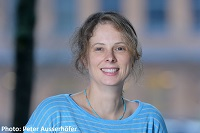 Prof. Dr. Kerstin Martens
Prof. Dr. Kerstin MartensThe German Research Foundation (DFG) has approved a new Collaborative Research Centre (CRC) "Global Development Dynamics of Social Policy" at the University of Bremen. Over the next four years, the CRC will receive funding of around 11 million euros.
The CRC was applied for by scientists of SOCIUM (Research Centre on Inequality and Social Policy) and InIIS. The speaker will be Professor Herbert Obinger (SOCIUM). Prof. Dr. Kerstin Martens, who will also be a member of the spokesperson team, was instrumental in the application process.
Thus far, this research has focused heavily on the comparison of highly industrialized countries. In the new Collaborative Research Center, the development dynamics of social policy will be analyzed in a perspective that also encompasses the global South. The CRC’s research program will go above and beyond previous social policy research in several respects. First, the program will bring international connections and networks to the forefront of research. National social policy cannot be explained solely on the basis of domestic conditions. Trade relations, migration, war, and colonialism, as well as the worldwide spread of ideas and rules of law, are of great significance for the socio-political developments of individual countries. Second, research in the CRC will be based on a broad understanding of social policy, including, among other things, education policy. Third, the CRC will replace the nation-state internal orientation of social policy research with an interdependency-centered approach.
The research network will be composed of 16 sub-projects and divided into two project areas. Project area A “Global Development Dynamics” (Globale Entwicklungsdynamiken) will consist of six sub-projects, examining the dynamics of development in various fields of social policy worldwide and developing a "Global Welfare State Information System" (WeSIS) database to cover all fields. Prof. Kerstin Martens from InIIS and Prof. Michael Windzio are leading the sub-project "Global Development, Diffusion and Transformation of Education Systems".
Project area B "Transregional Development Dynamics" uses case-study centered qualitative analyses to investigate the causal pathways between international interdependences and socio-political development dynamics for individual groups of countries. Here, InIIS is involved in three projects:
-“Mechanisms for the Dissemination of Social Policy” headed by Frank Nullmeier (SOCIUM), Klaus Schlichte (InIIS) and Delia González de Reufels (Institute of History)
-“Open welfare states? Social Security of Labour Migration and its Impact on National Policy” headed by Prof. Susanne K. Schmidt (InIIS)
-“Transnational Welfare: Ascent, Decay and Renaissance of Social Policy in Africa” headed by Prof. Klaus Schlichte and Dr. Alex Veit (both InIIS).
In addition to the SOCIUM Research Center on Inequality and Social Policy and the Institute for International and Intercultural Studies (InIIS), other institutes of the University of Bremen will also be involved: the Institute of History, the Institute of Geography, the Institute for Labour and Economy (IAW), the Center of European Law and Politics, and the Working Group Information Management of the Department of Computer Science. Other collaborators include the Jacobs University Bremen, the University of Duisburg-Essen and the University of Cologne. The start of the Collaborative Research Center is scheduled for early 2018.
The start of the Collaborative Research Center is scheduled for early 2018.
You will find further information on the websites of SOCIUM and the University of Bremen.
 Logo DVPW
Logo DVPW„Fünfte Offene Sektionstagung“ der Sektion „Internationale Beziehungen“ der Deutschen Vereinigung für Politikwissenschaft (DVPW)
Call for Papers (als pdf)
Zur Website dieser Sektionstagung
Sehr geehrte Kollegin, sehr geehrter Kollege, mit diesem Schreiben möchte das Sprecher-Team der DVPW-Sektion „Internationale Beziehungen“ gerne auf die „Fünfte Offene Sektionstagung“ der Sektion hinweisen, die vom 4. bis 6. Oktober 2017 an der Universität Bremen stattfindet. Wir möchten Sie in diesem Zusammenhang auch gerne bitten, die Nachricht an Ihre Mitarbeiterinnen und Mitarbeiter weiterzuleiten. Wir würden uns sehr freuen, Sie und Ihre Mitarbeiterinnen und Mitarbeiter in Bremen begrüßen zu können. Wir bitten darum, Vorschläge für einzelne Papiere oder ganze Panels (mit 3-4 Papieren, Diskussionsleitung und Diskutant/in) aus allen Bereichen der Internationalen Beziehungen bis spätestens 31. März 2017 per E-Mail an folgende Adresse zu senden: offenesektionstagung2017@gmail.com. Die Vorschläge sollten die vollständigen Kontaktdaten aller beteiligten Personen und einen Abstract der Papiere von jeweils maximal 200 Wörtern enthalten. Beiträge sind in deutscher oder englischer Sprache einzureichen. Der Best Paper Award der Tagung, welchen die Redaktion der Zeitschrift für Internationale Beziehungen (ZIB) gemeinsam mit dem Sektionsvorstand verleihen wird, gilt jedoch nur für deutschsprachige Aufsätze. Für die Konferenz steht keine Finanzierung der Reise- und Aufenthaltskosten der Teilnehmer/innen zur Verfügung. Es wird ein Teilnahmebeitrag von 30 Euro erhoben. Weitere Informationen (Anfahrt, Kontoverbindung etc.) folgen in Kürze auf den Internet-Seiten des Instituts für Interkulturelle und Internationale Studien (InIIS) der Universität Bremen und der Sektion „Internationale Politik“. Bei Fragen wenden Sie sich bitte an die Sprecher/innen der Sektion:
Margit Bussmann: bussmann@uni-greifswald.de
Klaus Schlichte: kschlich@uni-bremen.de
Stephan Stetter: stephan.stetter@unibw.de
Roy Karadag (verantwortlich für die Organisation vor Ort): karadag@uni-bremen.de
Die Videoaufzeichnung des Vortrages kann auf der Seite des Hamburger Instituts für Sozialforschung abgerufen werden.


